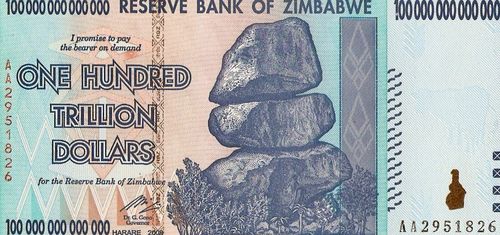Robert Gabriel Mugabe (Harare, 21 February 1924) is a Zimbabwean revolutionary and politician who is the President of Zimbabwe. As one of the leaders of the rebel groups against white minority rule, he was elected as Prime Minister, head of government, in 1980, and served in that office until 1987, when he became the country's first executive head of state. Having been repeatedly re-elected, he retains this post to this day. He has led the Zimbabwe African National Union – Patriotic Front (ZANU–PF) since 1975.
Robert Mugabe rose to prominence in the 1960s as the Secretary General of ZANU during the conflict against the conservative white minority government of Rhodesia. Mugabe was a political prisoner in Rhodesia for more than 10 years between 1964 and 1974. Upon release Mugabe, along with Edgar Tekere, left Rhodesia in 1975 to re-join the fight during the Rhodesian Bush War from bases in Mozambique.
At the end of the war in 1979, Mugabe emerged as a hero in the minds of many Africans. He won the general elections of 1980
after calling for reconciliation between the former belligerents,
including white Zimbabweans and rival political parties, and thereby
became Prime Minister on Zimbabwe's independence in April 1980.
In August 2008, Robert Mugabe suffered a narrow defeat in the first
round of a presidential election but he subsequently won the run-off
election
in a landslide after opposition rival Morgan Tsvangirai withdrew from
the race, and extended a hand to the opposition with the signing of a
power-sharing deal with opposition leaders Morgan Tsvangirai and Arthur Mutambara of the MDC-T and MDC-M opposition party.
On 3 August 2013, the Zimbabwe Election Commission said Mugabe won
his seventh term as President, defeating Tsvangirai with 61 percent of
the vote.
After a campaign marked by intimidation from all sides, mistrust from
security forces and reports of full ballot boxes found on the road, the
Shona
majority was decisive in electing Mugabe to head the first government
as prime minister on 4 March 1980. ZANU won 57 out of 80 Common Roll
seats in the new parliament, with the 20 white seats all going to the Rhodesian Front.
Mugabe, whose political support came from his Shona-speaking homeland in the north, attempted to build Zimbabwe on a basis of an uneasy coalition with his ZAPU rivals, whose support came from the Ndebele-speaking south, and with the white minority. Mugabe sought to incorporate ZAPU into his ZANU led government and ZAPU's military wing into the army. ZAPU's leader, Joshua Nkomo, was given a series of cabinet positions in Mugabe's government. However, Mugabe was torn between this objective and pressures to meet the expectations of his own ZANU followers for a faster pace of social change.
In 1983, Mugabe fired Nkomo from his cabinet, triggering bitter fighting between ZAPU supporters in the Ndebele-speaking region of the country and the ruling ZANU. Mugabe accused the Ndebele tribe of plotting to overthrow him after sacking Nkomo. Between 1982 and 1985, the military crushed armed resistance from Ndebele groups in the provinces of Matabeleland and the Midlands, leaving Mugabe's rule secure. Mugabe has been accused by the BBC's Panorama programme of committing mass murder during this period of his rule, after the show investigated claims made by political activist Gary Jones that Mugabe had been instrumental in removing him and his family from his farmland. A peace accord was negotiated in 1987. ZAPU merged into the Zimbabwe African National Union-Patriotic Front (ZANU-PF) on 22 December 1988. Mugabe brought Nkomo into the government once again as a vice-president.
Mugabe, whose political support came from his Shona-speaking homeland in the north, attempted to build Zimbabwe on a basis of an uneasy coalition with his ZAPU rivals, whose support came from the Ndebele-speaking south, and with the white minority. Mugabe sought to incorporate ZAPU into his ZANU led government and ZAPU's military wing into the army. ZAPU's leader, Joshua Nkomo, was given a series of cabinet positions in Mugabe's government. However, Mugabe was torn between this objective and pressures to meet the expectations of his own ZANU followers for a faster pace of social change.
In 1983, Mugabe fired Nkomo from his cabinet, triggering bitter fighting between ZAPU supporters in the Ndebele-speaking region of the country and the ruling ZANU. Mugabe accused the Ndebele tribe of plotting to overthrow him after sacking Nkomo. Between 1982 and 1985, the military crushed armed resistance from Ndebele groups in the provinces of Matabeleland and the Midlands, leaving Mugabe's rule secure. Mugabe has been accused by the BBC's Panorama programme of committing mass murder during this period of his rule, after the show investigated claims made by political activist Gary Jones that Mugabe had been instrumental in removing him and his family from his farmland. A peace accord was negotiated in 1987. ZAPU merged into the Zimbabwe African National Union-Patriotic Front (ZANU-PF) on 22 December 1988. Mugabe brought Nkomo into the government once again as a vice-president.
in Wikipédia





Sem comentários:
Enviar um comentário